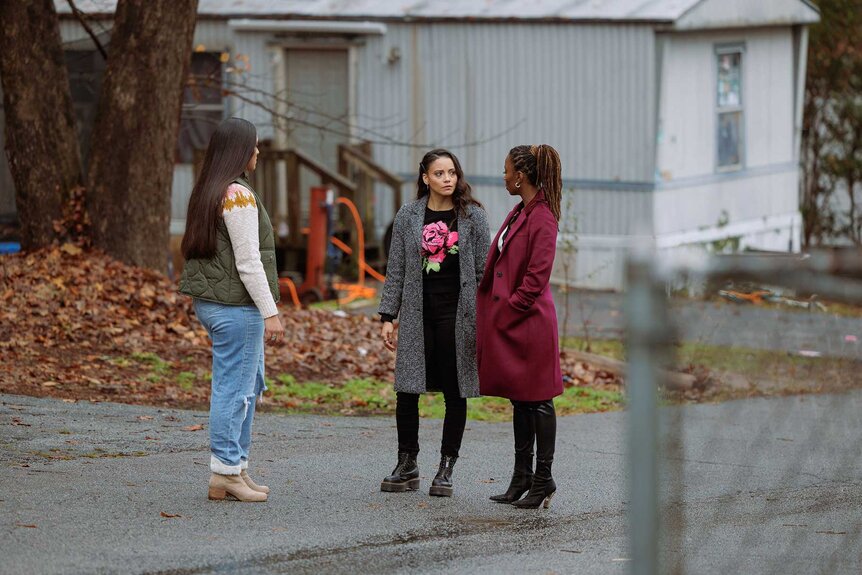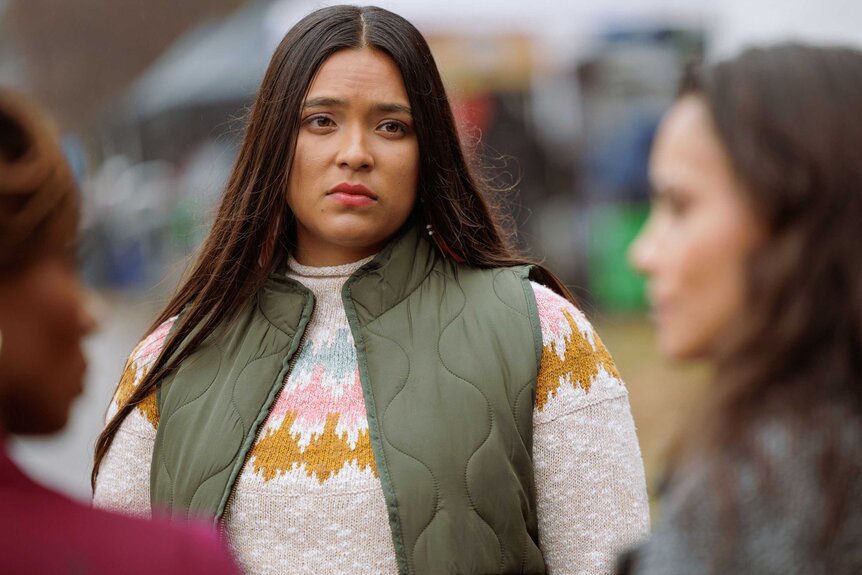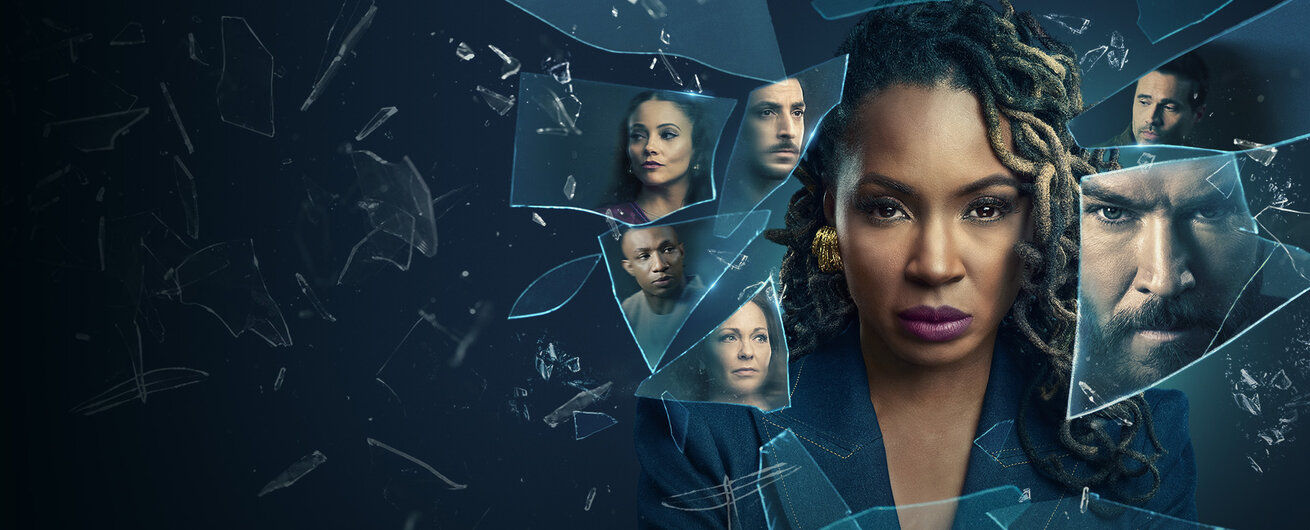Create a free profile to get unlimited access to exclusive show news, updates, and more!
How Does Tribal Law Works on Indian Reservations? An Expert Weighs In
Gabi Mosely and her team face tension with tribal police on the latest episode of Found, but how does the tribal justice system really work?
When a pregnant Native American woman disappeared, Gabi Moseley (Shanola Hampton) and her team on Found were in a rush against time to save the lives of the missing teacher Denae Wagon (Emily Alabi) and her unborn child, but first they had a jurisdictional hurdle to clear.
Since Denae’s car was found abandoned on reservation land in Virginia, they also had to contend with Denae’s protective older brother Kai (Adam Beach) — who just happened to lead up the Tribal Police — and he wasn’t all that thrilled to have the Mosely & Associates team on the case.
So, just what rights do tribal police have on Indian reservations? It turns out, a lot.
What role do the Tribal Police play?
Indian land is typically overseen by tribal law enforcement agencies or the Bureau of Indian Affairs (BIA).
“Tribal police definitely are the first responders,” Matthew Fletcher, a law professor at the University of Michigan, told NBC Insider. “They are trained like every other state and local police departments are.”
These tribal law enforcement agencies provide a broad range of services and “investigate crimes, enforce traffic laws, execute arrest warrants, serve process, provide court security, and conduct search and rescue operations," according to the Bureau of Justice Statistics.
There are 234 tribally operated law enforcement agencies and 23 police agencies operated by the BIA across the United States, the agency states.
RELATED: Will Gabi Find Romance on Found? Why Sir Throws a Wrench in Her Love Life
In the case of a missing woman, like the harrowing case portrayed on Found, it’s likely federal authorities would be called in to help.
“So the tribal police would investigate, but if the case involved a felony, which this would definitely involve, then the tribe and the tribal prosecutor would refer the case to the United States Attorney’s Office and the feds would then take over,” Fletcher explained.
The FBI is called in to work with tribal police to investigate and enforce laws related to major crimes. This would include homicides, kidnappings, and drug trafficking cases, according to the FBI.
The FBI also helps with initiatives related to Missing or Murdered Indigenous Persons (MMIP), domestic violence, sex offenses, victim services, and training for tribal law enforcement officers.
How does the tribal judicial system differ from the state system?
While Fletcher said tribal police operate much in the same way that local or state police would, there are some noticeable differences between the judicial systems.
“If it’s an Indian person, the tribe can prosecute that person, and so can the federal government, but the tribe’s ability to put somebody in jail is limited to either one or three years and that depends on whether the tribe has adopted certain federal laws that require certain things. If they haven’t then the max is one year, no matter what the crime is,” he said.
According to Fletcher, about two or three dozen tribes have adopted what’s known as “enhanced sentencing” that would extend a sentence out to three years.
Another difference is that Fletcher said it’s “not likely” tribal courts would prosecute juveniles.
There also can be differences between tribal courts and state-level courts when it comes to a defendant’s right to counsel.
“Some tribes, like tribes here in the lower peninsula of Michigan, have much broader right to counsel than you would see in state court and some tribes have much less, it depends on resources,” Fletcher said.
Although tribal courts still “have to follow federal criminal procedure rules,” Fletcher said their procedures are often “much more streamlined.”
Major crimes like murders or kidnappings would likely be referred to federal prosecutors. But an ongoing challenge has been that for a long time federal prosecutors have declined to pursue “about half of all cases of violence against Native Americans,” NBC News reported.
Congress has recently made some efforts to try to change that.
Although there are some BIA jails or some tribes that may operate their own jails, Fletcher said most tribes rent space from local county jails for a prisoner to serve out their sentence.
Impact of the Oklahoma v. Castro-Huerta Ruling
For hundreds of years, state and local law enforcement agencies had no rights to prosecute cases that occurred on tribal lands, but the recent, and controversial, US Supreme Court ruling in Oklahoma v. Castro-Huerta has given state governments the ability to prosecute certain cases.
Under the 2022 ruling, federal, tribal and state governments now have the ability to prosecute cases where a non-Native person committed a crime on tribal land against a Native person. The ruling seemingly removes jurisdictional boundaries that had long been in place, according to NBC News.
“As a matter of state sovereignty, a State has jurisdiction over all of its territory, including Indian country,” Justice Brett Kavanaugh wrote in the court’s majority opinion.
The ruling, which overturned nearly 200 years of recognizing the tribal lands ability to self-govern, has drawn criticism from tribal leaders who worry it could further erode tribes’ abilities to govern their own people.
“As a citizen of a tribal nation, I feel violated,” Elizabeth Reese, an assistant professor at Stanford Law School and a citizen of the Nambé Pueblo, told NBC News last year after the decision. “After fighting for our own independence, and then negotiating this shared situation with the federal government for so long, it’s just an erosion of our ability to be the governments that we are.”
According to Fletcher, although state and local agencies may now have more authority to investigate and pursue cases on tribal lands, they often don’t have the resources to do so.
“State and local governments tend not to come on the reservation simply because they don’t have the resources to do it,” he said.
To find out what happened with Gabi's latest case, tune into Found Tuesdays at 10/9c on NBC or available streaming the next day on Peacock.





















